The play to be performed is usually between two or three months away from the opening night and you tend to rehearse for three hours, three times a week say on a Monday Wednesday and Friday night. Nearer the performance week the cast may rehearse for some time on a Sunday - perhaps four hours. Is this enough? Usually not, and when I was working fulltime I would spend my breaks and lunch hour rehearsing privately as well as at home when I wasn't out rehearsing. So clearly putting in plenty of time going over the lines is important.
I have found that getting them learnt as early as possible really helps the final performance because once the script is out of your hand, and really, only then, can the character be worked on and your confidence in the words and part, grow.
A lot of actors would say that your physical place on the stage is very important for learning the lines as your brain associates where you are positioned with the lines delivered. I would agree. If you go marching off in a different direction during a performance or rehearsal you risk confusing the association and therefore the line. The same happens if another person isn't in the place they normally are.
In regard to the lines themselves I have used a variety of tricks from writing them out in big letters to looking at the lines themselves and how the words are spelt and linking them. Eg: The water was falling down all over him, Brian. Here I have connected the w in the word water and was and in my head I would also visualise what I was reporting. I also find that playing with the lines and saying them out loud and in a daft and very much exaggerated voice to myself can help. Sometimes I pace around the room at speed to build up an energy whilst saying the lines. Finding the rythmn in the speech and looking for light and shade helps too.
Once the lines are getting in my head I put the book down and try and do as much as I can without it. Naturally it is very important to be able to remember the other characters lines as well - or at least the gist of what they are saying and the cues. The cue is the block of words at the end of the previous line.
On top of all this is the useful habit of knowing the storyline backwards so you have an holistic grasp of the play. Then of course it is vital to know your character and build upon the interpretation in conjunction with your fellow actors and the director.
I write regular theatre reviews, features and interviews and reflect on my previous/current work on the stage.
Wednesday, 30 December 2009
Sunday, 27 December 2009
Two left feet and a voice to die for.
My blogging friend French Fancy recently asked me if, as well as act, could I sing and dance. My immediate answer was “no” shortly followed with a little chuckle to myself. The private chuckle was a shortcut version of “you wouldn’t ask that question if you’d seen/heard me try.” Perhaps I am too unfair on myself, that way. I’ve grown up with a taste and liking for musical theatre and at one point in my life you couldn’t keep me out of London’s West End enjoying Lloyd Webber’s latest opus.
How can you ever say how something started? A germ of an idea, a song heard, an experience encountered somewhere along the way. A visit to a pantomime in childhood or parents playing music at home. Music was taught at my junior and senior schools and although I wasn’t a particularly appreciative or attentive pupil I do remember being struck by the poetic power of a recording of Peter Grimes and the music for Peter and the Wolf. And I was only a small boy- nine or ten at most.
I feel this personal admiration for musical theatre is worth investigating and want to see where this enthusiasm came from. I guess ‘home life’ would be good place to start. Now my parents weren’t theatre goers but they did like the circus and we possibly attended a panto or two along the way. They also liked Variety shows live and televised and so I would have heard songs sung through that medium and possibly some were show songs. We did go and see films regularly and some of them would have been MGM and Disney musicals – Show Boat – South Pacific – Annie get your gun – Paint your Wagon, Mary Poppins etc. I remember rather fancying Doris Day in Calamity Jane, too. I was probably in my early teens. One Christmas I got given a book called Gotta Sing Gotta Dance so I must have shown some keenness. On a Sunday my step sisters and I got sent off to Sunday School and we sung the hymns there too. Reluctantly.
Speaking to my mum she reminded me today that we had Chitty Chitty Bang Bang, Paint your Wagon, Fiddler on the Roof, The Sound of Music, Mary Poppins and the Oliver film soundtracks on LPs along with other popular shows often playing on the record player at home in the background. My parents were also big fans of Harry Secombe and Shirley Bassey as well. Both of these artists vocally dramatic in their own right. This must have some influence, surely. Or is that Shirley? They liked Tom Jones too but that is not unusual. :0)
When I was around sixteen or seventeen I was a member of the Scout Association and got involved in the Scout Gang Shows in Derby. There was a lot of singing involved and these fun times would have been some of my early stage experiences. Then there was the group singing of songs that we used to sing around the camp fires and at scout meetings. Nobody minded if you weren’t note perfect. We just did it for camaraderie, all wrapped up in one’s badge filled and grubby campfire blanket, a cup of scolding hot tomato soup in a tin mug in hand and the sparks from the fire threatening to turn you into a singing fireball. The Gang Show singing had to be better as we had paying audiences and camp fires weren’t allowed on stage. Joking apart, I don’t remember the rehearsals being reliant on whether the young men were pitch perfect or not. I think enthusiasm and good spirit were the key to the entertainment.
Then I went to Belgium with the Scouts on a camping holiday. It was the first time I had ever been abroad and it was all very exciting. One day we went on a trip into the city of Brussels and I distinctly recall buying a cassette tape of the highlights of Jesus Christ Superstar, the original London production. I’m not sure now why I was drawn to this musical – did I know some of the songs already? Perhaps just the title song and ‘I don’t know how to love him’. Who knows? What I do know is that I played that tape to death and loved the idea of a story unfolding through drama and music. A lack of religious interest had nothing to do with it. It was the power of the drama set to music. Saying that, Opera has never done it for me. As time went on I was very much into collecting soundtracks from films and began to choose soundtracks from musicals too.
As I got into my late teens I had left the Scouts and discovered beer. Slippery slope. Going down the pub suddenly seemed a lot more attractive than the cold Scout hut on Friday night. I had also joined The Littleover Players and got to know people who liked to go the theatre for entertainment. Almost instantly I became very keen on going to the brand new Derby Playhouse in the Eagle Centre in Derby. I would go and see ‘every’ play they did, often two or three times – much to my dear old Dad’s dismay who saw going to see anything more than once and paying for the privilege a scurrilous waste of money. I got seriously in Godspell (saw it many a time) and The Rocky Horror Show and Trafford Tanzi and of course, Jesus Christ Superstar. I also thrilled to go and see the film versions of JCS and Victor Garber and bouncy cast in Godspell.
Naturally, I collected the albums and played them in my bedroom at home, interspersed with Leo Sayer, David Essex, T.Rex , 10CC, Queen, David Bowie, Peter Gabriel and Kate Bush, that is. They came under my fuddy duddy Dad’s heading of Modern Muck, so I loved them even more. What would he have thought of Ruiyichi Sakamoto?
My step Mum has become a big fan of Phantom over the years and has been taken to a few shows in London and touring shows at the Theatre Royal in Nottingham. She’s great – she either falls asleep or hums along quite forgetting she’s in a public space with all with the various attendant siblings hushing her. Bless her.
Lastly, I confess I know nothing about notation or the understanding of musical writing. I don’t play any instruments (I failed the triangle auditions at junior school and was seriously out of tune with the comb and paper). Nor, in honesty do I sing well. I have, however a great admiration for those that can master these talents/disciplines and have worked with such folk along the way so far and have thoroughly enjoyed the experience. As for dancing… I would say that my modern ballet style has to be seen to be believed, and then quickly forgotten. lol
How can you ever say how something started? A germ of an idea, a song heard, an experience encountered somewhere along the way. A visit to a pantomime in childhood or parents playing music at home. Music was taught at my junior and senior schools and although I wasn’t a particularly appreciative or attentive pupil I do remember being struck by the poetic power of a recording of Peter Grimes and the music for Peter and the Wolf. And I was only a small boy- nine or ten at most.
I feel this personal admiration for musical theatre is worth investigating and want to see where this enthusiasm came from. I guess ‘home life’ would be good place to start. Now my parents weren’t theatre goers but they did like the circus and we possibly attended a panto or two along the way. They also liked Variety shows live and televised and so I would have heard songs sung through that medium and possibly some were show songs. We did go and see films regularly and some of them would have been MGM and Disney musicals – Show Boat – South Pacific – Annie get your gun – Paint your Wagon, Mary Poppins etc. I remember rather fancying Doris Day in Calamity Jane, too. I was probably in my early teens. One Christmas I got given a book called Gotta Sing Gotta Dance so I must have shown some keenness. On a Sunday my step sisters and I got sent off to Sunday School and we sung the hymns there too. Reluctantly.
Speaking to my mum she reminded me today that we had Chitty Chitty Bang Bang, Paint your Wagon, Fiddler on the Roof, The Sound of Music, Mary Poppins and the Oliver film soundtracks on LPs along with other popular shows often playing on the record player at home in the background. My parents were also big fans of Harry Secombe and Shirley Bassey as well. Both of these artists vocally dramatic in their own right. This must have some influence, surely. Or is that Shirley? They liked Tom Jones too but that is not unusual. :0)
When I was around sixteen or seventeen I was a member of the Scout Association and got involved in the Scout Gang Shows in Derby. There was a lot of singing involved and these fun times would have been some of my early stage experiences. Then there was the group singing of songs that we used to sing around the camp fires and at scout meetings. Nobody minded if you weren’t note perfect. We just did it for camaraderie, all wrapped up in one’s badge filled and grubby campfire blanket, a cup of scolding hot tomato soup in a tin mug in hand and the sparks from the fire threatening to turn you into a singing fireball. The Gang Show singing had to be better as we had paying audiences and camp fires weren’t allowed on stage. Joking apart, I don’t remember the rehearsals being reliant on whether the young men were pitch perfect or not. I think enthusiasm and good spirit were the key to the entertainment.
Then I went to Belgium with the Scouts on a camping holiday. It was the first time I had ever been abroad and it was all very exciting. One day we went on a trip into the city of Brussels and I distinctly recall buying a cassette tape of the highlights of Jesus Christ Superstar, the original London production. I’m not sure now why I was drawn to this musical – did I know some of the songs already? Perhaps just the title song and ‘I don’t know how to love him’. Who knows? What I do know is that I played that tape to death and loved the idea of a story unfolding through drama and music. A lack of religious interest had nothing to do with it. It was the power of the drama set to music. Saying that, Opera has never done it for me. As time went on I was very much into collecting soundtracks from films and began to choose soundtracks from musicals too.
As I got into my late teens I had left the Scouts and discovered beer. Slippery slope. Going down the pub suddenly seemed a lot more attractive than the cold Scout hut on Friday night. I had also joined The Littleover Players and got to know people who liked to go the theatre for entertainment. Almost instantly I became very keen on going to the brand new Derby Playhouse in the Eagle Centre in Derby. I would go and see ‘every’ play they did, often two or three times – much to my dear old Dad’s dismay who saw going to see anything more than once and paying for the privilege a scurrilous waste of money. I got seriously in Godspell (saw it many a time) and The Rocky Horror Show and Trafford Tanzi and of course, Jesus Christ Superstar. I also thrilled to go and see the film versions of JCS and Victor Garber and bouncy cast in Godspell.
Naturally, I collected the albums and played them in my bedroom at home, interspersed with Leo Sayer, David Essex, T.Rex , 10CC, Queen, David Bowie, Peter Gabriel and Kate Bush, that is. They came under my fuddy duddy Dad’s heading of Modern Muck, so I loved them even more. What would he have thought of Ruiyichi Sakamoto?
As I was living at home until my mid twenties, I had plenty of spare money from my job as a butcher and started to go down to London to see the big shows. My very first outing in this way was to see the dance based show, A Chorus Line, at the Theatre Royal on Drury Lane. From then on I was hooked and went to see Evita, Chess, Les Misérables, Man of La Mancha, Joseph, West Side Story, Barnum, Cabaret, Song and Dance, The Phantom of the Opera, Billy, Starlight Express, Cats, Aspects of Love,The Hired Man, Martin Guerre, Miss Saigon and so on. Some of the shows got me particularly interested and for periods of time I became extremely (almost fanatically) keen on certain shows. The main ones in this respect would have been Cats, Phantom, Les Mis, Barnum, Jesus Christ Superstar, Godspell, Miss Saigon and The Hired Man. If there is such a thing as singalonga musicals then I have sunglaonga to those ones at home, very badly, but very enjoyably. Back then I collected all the programmes too as a paper remider of glorious theatre visits.
My step Mum has become a big fan of Phantom over the years and has been taken to a few shows in London and touring shows at the Theatre Royal in Nottingham. She’s great – she either falls asleep or hums along quite forgetting she’s in a public space with all with the various attendant siblings hushing her. Bless her.
At some point in my twenties and having joined Derby Theatre in the Round and been in the chorus in Cabaret myself (I look great in fishnets and frilly hot pants – joke) the name of a fella called Stephen Sondheim, composer and lyricist, entered my consciousness. Apparently, he was quite good. I went down to London to the English National Opera House near Covent Garden to see Pacific Overtures on recommendation and instantly became a fan. I can’t say that I’ve been lucky enough to see or hear everything by the man, but my favourites are Company, Follies, Sweeney Todd – demon barber of Fleet Street, Sunday in the Park with George, Into the Woods, Pacific Overtures and A Little Night Music.
Lastly, I confess I know nothing about notation or the understanding of musical writing. I don’t play any instruments (I failed the triangle auditions at junior school and was seriously out of tune with the comb and paper). Nor, in honesty do I sing well. I have, however a great admiration for those that can master these talents/disciplines and have worked with such folk along the way so far and have thoroughly enjoyed the experience. As for dancing… I would say that my modern ballet style has to be seen to be believed, and then quickly forgotten. lol
Tuesday, 22 December 2009
No such thing as a small part...
No such thing as a small part, only a small actor. (meaning 'small' in outlook)
This is a theatrical adage or maxim I was party to learning many years ago. Sometimes in casting should one be lucky enough to get a part in a play, it may not be the largest, the main part or the sexiest part, but a 'bit' part - the servant, the spear carrier, the almost walk on or generally a tiny role in a production. Over the years, and particularly when I was with Derby Theatre In The Round I was often offered a diddy role to play when, as a young-enthusiastic, but naive actor, I really - heart of hearts - would have liked to have played the lead. Sometimes you are just not right for it and deemed keen, but inexperienced. It seems a tough choice at the time. However, it is often correct and strange as it may seem at the time, a good chance to learn.
Sometimes such a role can come out of the blue and be a great opportunity to be involved in a top class production and be just as vital to the piece as one of the main roles. In the Lace Market Theatre's recent production of Festen I was offered such a role (Kim the chef) because the original actor was alledgedly unreliable and unavailable a week before the production opened. My experience and reputation that I have built up over many years of theatre experience allowed me the opportunity to say 'yes' to such an offer and it proved to be one of he most rewarding small parts I've done in years and allowed me to meet a whole new bunch of good actors and work with them.
This is a theatrical adage or maxim I was party to learning many years ago. Sometimes in casting should one be lucky enough to get a part in a play, it may not be the largest, the main part or the sexiest part, but a 'bit' part - the servant, the spear carrier, the almost walk on or generally a tiny role in a production. Over the years, and particularly when I was with Derby Theatre In The Round I was often offered a diddy role to play when, as a young-enthusiastic, but naive actor, I really - heart of hearts - would have liked to have played the lead. Sometimes you are just not right for it and deemed keen, but inexperienced. It seems a tough choice at the time. However, it is often correct and strange as it may seem at the time, a good chance to learn.
Sometimes such a role can come out of the blue and be a great opportunity to be involved in a top class production and be just as vital to the piece as one of the main roles. In the Lace Market Theatre's recent production of Festen I was offered such a role (Kim the chef) because the original actor was alledgedly unreliable and unavailable a week before the production opened. My experience and reputation that I have built up over many years of theatre experience allowed me the opportunity to say 'yes' to such an offer and it proved to be one of he most rewarding small parts I've done in years and allowed me to meet a whole new bunch of good actors and work with them.
Sunday, 20 December 2009
A Christmas Carol – an adaptation for the stage. The adaptor’s story.

A Christmas Carol by Charles Dickens adapted for the stage by writer Phil Lowe
In the Spring of 2008 the Lace Market Theatre came to me to ask if I would be interested in adapting Charles Dickens’s novel for the stage. They were looking for something different and traditional to perform in the December of that year and they knew that there would be at least three pantos performed in the city of Nottingham alone at that time. This request was based on knowing me as a member of the theatre club and the fact that I had performed a one man show version twice in former years at a church venue for charity. However, despite writing and conceiving some pieces for performance in my University years (1989 -1992) on a Performance Art degree course, I had never written a full length play with music before!
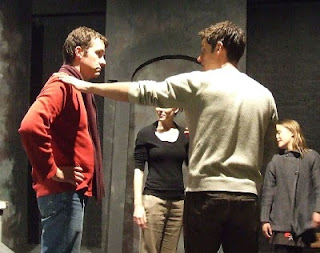
Martin Berry directs.
The writing took approximately seven months of my own time and entailed reviewing my script for my one man show, re-reading the novel three or four times and watching three versions of the story on DVD for further inspiration. The Muppets Christmas Carol (fun though it is) got left out in the proverbial snow. I was working full-time during this period and so the work was done in my own time (ok, I did take a few naughty sickies from work when the deadline for the script to be presented to the panel loomed ever nearer) mostly in the evening. Working on a Christmas story in the summer is weird, I can tell you.

David Kimmins multi-functional set . Design copyright.
Over time the play was accepted and a director (Martin Berry) and set designer (David Kimmins) chosen. I remember too that the auditions were happening in the early part of September of that year. I had just been made redundant from my job at Capital One and was taking a much needed holiday in France. Using the internet from the French Media Store FNAC as my only contact medium I was getting snippets of information about who had been chosen for the parts. I was so excited and slightly frustrated being away from the action back home. I had written the piece with thirty one parts to played by an ensemble. Twenty actors actually played them and aside from Scrooge, all the parts were shared. A good proportion of children were engaged and we had two teams of Cratchit kids because of performance laws.
Nephew Fred visits Uncle Scrooge
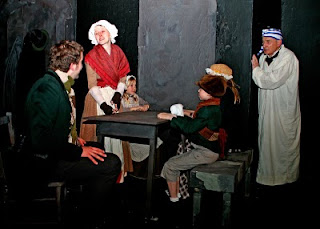
Scrooge observes the Cratchit family
I wanted the piece to be part narrated by a constantly changing array of experienced and vocally good actors male and female. The last thing I wanted in my imagining of the work was a single ‘I’m Charles Dickens’ actor sitting on a stool telling the story. It was also extremely important that all the actors and actresses were clear in their speeches. The Lace Market Theatre is only a small venue but vocal clarity is vital to the enjoyment of the play, I feel. Any play really, but especially such familiar Dickensian language. Get it wrong and it would jar.
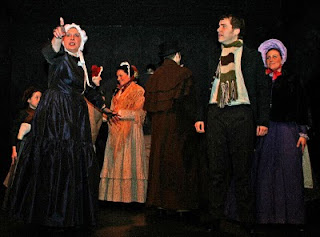
Festive market scene
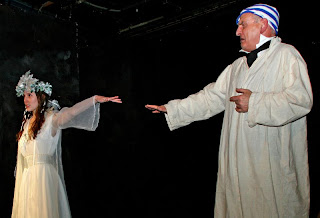
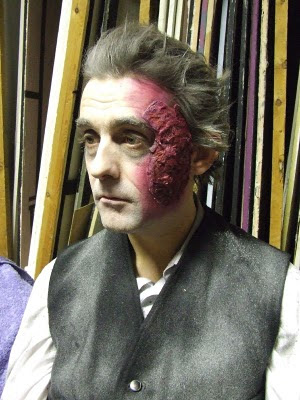
After I returned from France I attended some of the early rehearsals. Actually I found it hard to be away! Most of the play had been cast although for while we had no Nephew Fred and I’m sure over the rehearsals I read in every single part – even Tiny Tim! God bless him!
Make up for for Ghost of Christmas Past
As time went on I went into the theatre in the day time to help David Kimmins and his team build the set and set to painting it in various muted washes in grey, black, brown and deep green. It was very exciting for me to see it all coming together and watch Martin and his cast develop my script and improvise the action of the story. One of the main things I asked for was for there to be as little usage of props as possible. Not even a goose for the Cratchits' dinner. It worked great through mime.
Young Scrooge
The wardrobe department at the Lace Market Theatre is brilliant and many of the costumes were designed from scratch and as always the ladies there put in hours of hard work to ensure that it all looked wonderful and authentic to the time.
The Fezziwigs scene
Looking back at some notes I wrote for a radio interview at BBC Radio Nottingham I see that the first draft of my play was only twenty-nine pages long and would have lasted just over an hour! The finished piece was forty-five pages long. In performance each half was forty five minutes long and we had a twenty minute break. Obviously, I realised that an hour wasn’t really sufficient and I built on each scene for narrative bulk.
The hardest scenes to write were the festive market scenes (so they didn’t sound corny) and getting the scene between Mrs Dilby and Mrs Jones with Old Joe to sound credible to a modern audience. I also had to invent ways of linking each scene so that it all flowed nicely and told the story well. Fluidity was key. As I concentrated on the writing I would often get mental snatches of how it might all unfold on stage. I suppose having many years stage experience helped with that.

The Ghost of Christmas Past and Scrooge.
November came and rehearsals were going well and the fine tuning of the piece was happening on stage with the performers and the director and the members of the theatre who enjoy the technical side of performance were creating the lighting effects and sound effects. I felt the show was particularly blessed in the folk we had doing that. The actors were doing a sterling job too, despite some Winter colds and sniffles going about.

Make up for Marley's ghost.
Sometime along the way I met up with a team of nine young women students and their tutor from a beauty and theatrical make-up course from Castle College in Nottingham. They wanted to be involved in the production as a work experience and they kindly gave their time and make-up skills free of charge. They did a brilliant job.
Phil Lowe
So, the original production ran from 8th December to 13th December 2008 with two shows on the last day. It was a complete sell out and got a rave review in the local Nottingham Evening Post from the reviewer Alan Geary who called it the Lace Market Theatre’s ‘Top show in a good year’ and listed it in his review of the year 2008 as one of the top ten shows to be seen in Nottingham, both professional and amateur. Martin Berry (the director) and I managed, by hook or by crook, to sneak into every performance and were thrilled by this show made magic by all involved.
Mark Breach as Ghost of Christmas Present
The show has had another outing this year as Chilwell School in Nottingham put on three performances at the studio theatre there. I went along to see their last night and was excited to see the piece again and the sterling job the school children and their teachers Sally Stevens and Nicole Foyster had done with it. Some very accomplished performances, particularly Ewan Turner as Scrooge.
Roger Newman as Scrooge.
The script is available for professional and amateur use. For further information please contact me at phillming@aol.com. Please head email re: A Christmas Carol performance.
Update: the ebook is now available to download for £3.99 at
http://store.blurb.co.uk/ebooks/443316-a-christmas-carol-a-play
Update: the ebook is now available to download for £3.99 at
http://store.blurb.co.uk/ebooks/443316-a-christmas-carol-a-play
Subscribe to:
Posts (Atom)


















